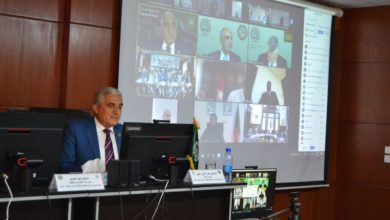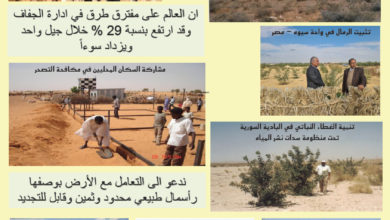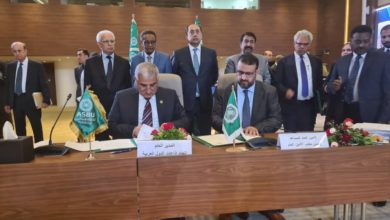ACSAD & Sultanate of Oman/ Training course
Yesterday, the training course events specialized for the technical cadres in the Sultanate of Oman launched on “The Integrated Management and Modern Technologies to Improve the Fruit Trees Production” organized by the Arab Center for the Studies of Arid Zones and Drylands (ACSAD).
This course comes for the benefit of 53 agricultural engineers from the Omani Ministry of Agriculture`s cadres via video technology aiming at building their scientific and practical competence on the topics of integrated management of nurseries and establishment of orchards, the agricultural service processes ( sexual propagation, Asexual/vegetative propagation, pruning, fertilization, irrigation & cultivation, and combating.) and pre and post-harvesting processes.
His Excellency, the Director-General of ACSAD Organization, Dr. Nasr Edin Obaid, said at the opening of the course that the ACSAD organization had achieved outstanding success stories, where the cultivation of 77 ACSAD genotypes of wheat and barley was adopted (7 genotypes in the Sultanate) produced by ACSAD`s experts were approved during the period. They were cultivated for hundreds of thousands of hectares in the Arab countries, cooperating with the national research centers. He said that they contributed to developing livestock by distributing 15000 heads of improved and high productive Awassi sheep and Shami goats, sending more than 35000 sperm straws to use in the artificial insemination of goats and sheep to improve production.
He also added that ACSAD provided the Arab countries with about 3 million seedlings of various fruit trees, particularly the olive ones, which amounted to 2.5 million seedlings, pistachio, and almond, as being essential crops for the Arab world with high economic value and tolerant to drought; besides to their providing a good income for the Arab peasants and farmers, as well as providing technical and logistical assistance in establishing the nurseries of olive, pistachio, and Almond especially in Lebanon, Yemen, Morocco, Libya, Jordan, Saudi Arabia, and the Sultanate of Oman. Sixteen dams had implemented in Syria, Lebanon, and Yemen contributed to providing water for the mountain villages, restoring more than 200000 hectares of degraded pastures, training 23000 Arab agricultural technicians, and issuing 159 high-level scientific references.
Dr. Obaid noted that ACSAD owned an important plant genetic pool of fruit trees at both Arab and regional levels in the ACSAD research station in Glenn; one of which essential botanical research stations contained about 500 varieties from various fruit trees; in addition to 13 research stations at the headquarters country, and two plant and animal research stations in each Arab country in the purpose of scientific and developmental cooperation and technology transfer.
The Director-General of ACSAD Organization pointed out that the scientific cooperation with beloved Sultanate Oman contributed to achieving several projects, one of which the foundation of an integrated database for natural grazing sites in the Sultanate; in addition to many training courses and capacities-building, knowing that the Sultanate of Oman is one of the founding to the ACSAD Organization.
He confirmed at his speech conclusion that this training course came as a result of existing collaboration with the Ministry of Agriculture, Fisheries Wealth & Water Resources in the field of “ The Integrated Management and Modern Technologies to Improve the Fruit Trees Productivity.” In line with the Organization`s goals and guidance as a house of experience working on training the Arab personnel in all various areas, especially in developing and improving the fruit trees.
In his part, Dr. Saif Bin Ali Al-khameesy, the director of the research center of plant production, the representative of the Ministry of Agriculture, fisheries Wealth & Water Resources, expressed his gratitude and appreciation to the ACSAD Organization represented by its Director-General, his Excellency Dr. Nasr Edin Obaid for organizing this important course. He emphasized the deep cooperation between ACSAD and the Ministry of Agriculture, Fisheries & Water Resources, pointing out the notable qualitative development of ACSAD`s performance and the intensity of its important activities under its new administration.
He also explained the climate and environmental diversity in the Sultanate of Oman had, which led to the diversity of agro-product variety of palm trees, Citrus, and Mango; even of the tropical crops in the Green Mountain such as Olive, Pistachio, fig, pomegranate, and other fallen leaf trees that need cooler climate. He concluded his speech by thanking the trainers and attendees, wishing that this course achieve its desirable benefit from its holding.
The activities of the course events were continued for five days. The scientific, practical applied training is provided by a group of experts from the Arab Center Organization (ACSAD) specializing and highly qualified at both international and Arab levels.



